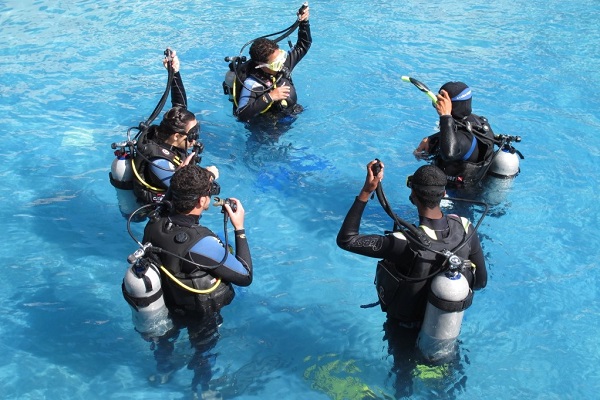
Dive into Adventure: Exploring the World Below with Open Water Courses
Imagine drifting weightlessly through crystal-clear waters, surrounded by vibrant marine life and colorful coral reefs. This dream can become a reality with open water courses, your gateway to the underwater world. In this blog post, we’ll dive into the fascinating world of open water courses, explore what they are, why they’re essential, and how they can transform your love for the ocean into a lifelong adventure.
1. What Are Open Water Courses?
Open water courses are comprehensive scuba diving programs designed to teach beginners the essential skills and knowledge required for safe and enjoyable underwater exploration. They typically consist of a combination of theory lessons, confined water training (usually in a pool), and open water dives in natural environments like oceans, seas, or lakes.
2. Why Take an Open Water Course?
a. Safety: Learning the fundamentals of scuba diving ensures that you can explore the underwater world safely. You’ll be trained in proper equipment use, buoyancy control, and emergency procedures.
b. Adventure: Open water courses provide you with the skills and confidence to embark on underwater adventures all around the world. From diving with marine life to exploring shipwrecks, the possibilities are endless.
c. Environmental Awareness: Many open water courses include modules on marine conservation, teaching divers to protect and preserve underwater ecosystems.
d. Personal Growth: Scuba diving is not just about the destination; it’s about the journey. It challenges you, builds confidence, and helps you conquer your fears.
3. What to Expect During an Open Water Course
During your open water course, you can expect to:
a. Learn the Basics: Understanding the principles of scuba diving, equipment use, and safety protocols is a fundamental part of the course.
b. Confined Water Training: Practice your scuba skills in a controlled environment like a swimming pool, where you can get comfortable with the equipment and underwater movements.
c. Open Water Dives: This is where the real adventure begins. You’ll complete several open water dives, putting your skills to the test in natural underwater environments.
d. Certification: Successful completion of the course will earn you an open water certification, allowing you to dive up to a specific depth with a buddy.
4. Choosing the Right Open Water Course
When selecting an open water course, consider factors like the reputation of the training agency, the instructor’s experience, and the course structure. Popular scuba diving organizations that offer open water courses include PADI (Professional Association of Diving Instructors) and NAUI (National Association of Underwater Instructors).
5. Embrace a Lifetime of Adventure
Once you’ve completed your open water course and obtained your certification, the underwater world becomes your playground. From exploring coral reefs teeming with marine life to delving into the history of sunken shipwrecks, scuba diving opens up a world of adventure. Consider advanced courses like advanced open water or specialty courses to refine your skills and explore more challenging dive sites.
6. Final Thoughts
Open water courses are not just about learning to scuba dive; they’re about discovering a new world filled with wonder, beauty, and endless possibilities. So, take the plunge, get certified, and embark on a lifetime of adventure beneath the waves. Whether you’re a nature enthusiast, an adventure seeker, or someone looking to conquer their fears, open water courses have something incredible to offer for everyone.
